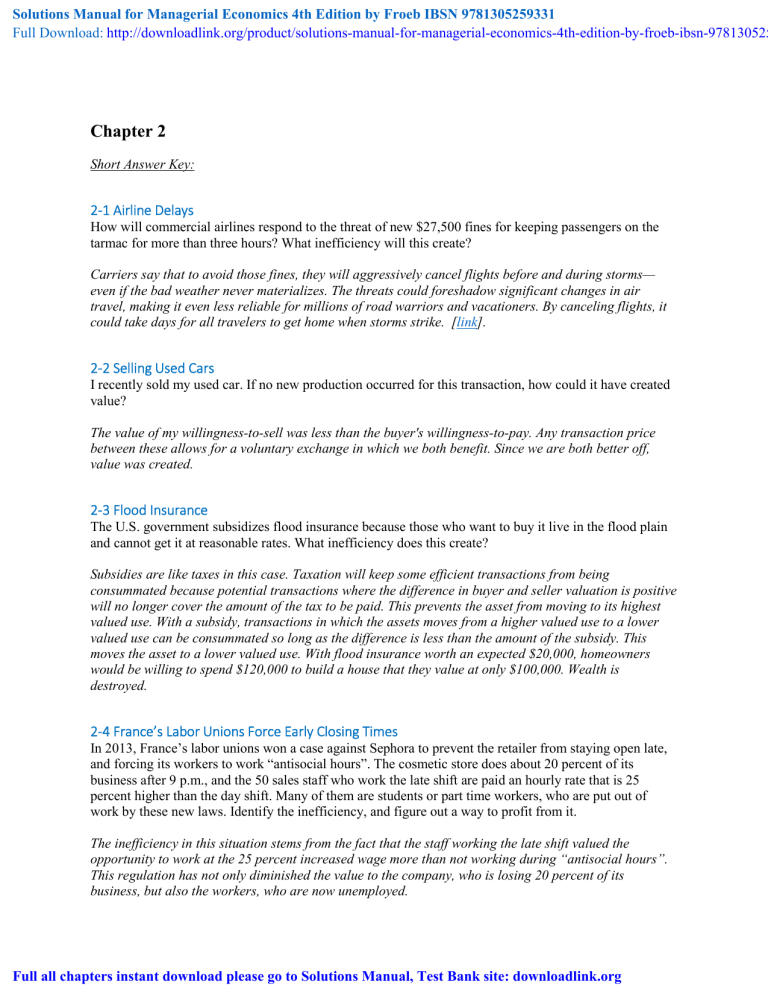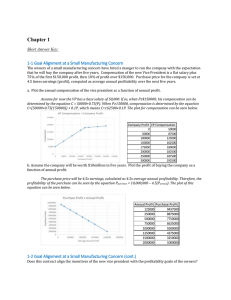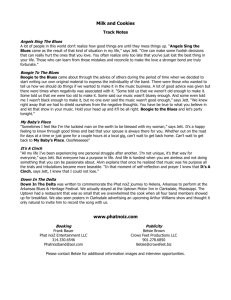
Solutions Manual for Managerial Economics 4th Edition by Froeb IBSN 9781305259331 Full Download: http://downloadlink.org/product/solutions-manual-for-managerial-economics-4th-edition-by-froeb-ibsn-978130525 Chapter 2 Short Answer Key: 2-1 Airline Delays How will commercial airlines respond to the threat of new $27,500 fines for keeping passengers on the tarmac for more than three hours? What inefficiency will this create? Carriers say that to avoid those fines, they will aggressively cancel flights before and during storms— even if the bad weather never materializes. The threats could foreshadow significant changes in air travel, making it even less reliable for millions of road warriors and vacationers. By canceling flights, it could take days for all travelers to get home when storms strike. [link]. 2-2 Selling Used Cars I recently sold my used car. If no new production occurred for this transaction, how could it have created value? The value of my willingness-to-sell was less than the buyer's willingness-to-pay. Any transaction price between these allows for a voluntary exchange in which we both benefit. Since we are both better off, value was created. 2-3 Flood Insurance The U.S. government subsidizes flood insurance because those who want to buy it live in the flood plain and cannot get it at reasonable rates. What inefficiency does this create? Subsidies are like taxes in this case. Taxation will keep some efficient transactions from being consummated because potential transactions where the difference in buyer and seller valuation is positive will no longer cover the amount of the tax to be paid. This prevents the asset from moving to its highest valued use. With a subsidy, transactions in which the assets moves from a higher valued use to a lower valued use can be consummated so long as the difference is less than the amount of the subsidy. This moves the asset to a lower valued use. With flood insurance worth an expected $20,000, homeowners would be willing to spend $120,000 to build a house that they value at only $100,000. Wealth is destroyed. 2-4 France’s Labor Unions Force Early Closing Times In 2013, France’s labor unions won a case against Sephora to prevent the retailer from staying open late, and forcing its workers to work “antisocial hours”. The cosmetic store does about 20 percent of its business after 9 p.m., and the 50 sales staff who work the late shift are paid an hourly rate that is 25 percent higher than the day shift. Many of them are students or part time workers, who are put out of work by these new laws. Identify the inefficiency, and figure out a way to profit from it. The inefficiency in this situation stems from the fact that the staff working the late shift valued the opportunity to work at the 25 percent increased wage more than not working during “antisocial hours”. This regulation has not only diminished the value to the company, who is losing 20 percent of its business, but also the workers, who are now unemployed. Full all chapters instant download please go to Solutions Manual, Test Bank site: downloadlink.org 2-5 Kraft and Cadbury When Kraft recently bid $16.7 billion for Cadbury, Cadbury’s market value rose, but Kraft’s market value fell by more. What does this tell you about the value-creating potential of the deal? It means that Kraft's shareholders, and potential shareholders, think that Kraft’s profits will fall. This would be the case if Kraft's $16.7 billion bid is greater than the present value of the expected future profits from the Cadbury unit. Essentially, the combined market value of the firms separately is greater than the market value of the firms together. The market thinks that combining these assets will destroy value. 2-6 Price of Breast Reconstruction Versus Breast Augmentation Two similar surgeries, breast reconstruction and breast augmentation, have different prices. Breast augmentation is cosmetic surgery not covered by health insurance. Patients who want the surgery must pay for it themselves. Breast reconstruction following breast removal due to cancer is covered by insurance. The price for one of the surgeries has increased by about 10% each year since 1995, whereas the other has increased by only 2%per year. Which of the surgeries has the lower inflation rate? Why? Market pressure comes from two sources: consumers who can choose not to purchase, and competitors who can offer lower prices. Breast augmentation is subject to both of these forces, and thus has a lower price, while breast reconstruction is covered by insurance where the consumer pressure is weaker. Notes on specific chapters These are brief notes that I use to prep myself for class, with links. See the 3e Instructor’s Guide for more detailed lesson notes. Chapter 1: What This Book is About Video Lecture: TVA barges sit at docks for two weeks 4e Textbook: Over-bidding for offshore gas tract 3e Instructor Manual: Sears Auto recommends unnecessary repairs; Kidder Peabody trader “games” his incentive pay (reproduced below). 2014 in-class stories/problems: Sotheby’s unprofitability; Capitalism & Greed; Surgi-centers overpaying for new acquisitions; Lincoln Electric movie; showing how piece rate compensation aligns incentives; Friedman v. Donohue on Greed; KIDDER-PEABODY (link): In 1992 Joseph Jett became a star bond trader for Kidder-Peabody, earning a two-million-dollar bonus. As his monthly profits grew, he was allowed to risk more and more capital in his trading portfolio, and was eventually promoted to head of the Government Trading Desk. By the end of 1993, Jett had been promoted to managing director. He also received the “Chairman’s Award” for outstanding performance, in addition to a $9 million year-end bonus. Joseph Jett traded “strips,” which involved separating the interest payments from the principal on a government bond. He specialized in putting interest payments back together with the stripped bonds, thus reconstructing original bond. This activity earns profits by taking advantage of yield differences between zero-coupon bonds (no interest payments) and interest-bearing bonds. However, at Kidder-Peabody, this activity seemed to earn profits—even in the absence of any yield differences. The antiquated information system at Kidder-Peabody tracked zero-coupon bonds by price instead of yield, which overstated their value once they entered the system. The information system rewarded Jett contemporaneously for sales of five-day forward contracts on reconstructed bonds. This allowed Jett to realize contemporaneous profits that would disappear in five days, when the computer recorded the future reconstruction. However, by rolling the contracts forward, Jett was able to keep these profits on the books. In order to make this work, Jett had to continuously increase the size of his portfolio. Early in 1994, the information system at Kidder began having trouble keeping up with Jett’s trading activity. From 1992-1994, Jett had traded about $1.7 trillion in government securities, about half of all outstanding government debt. When the source of the profits was uncovered, Kidder liquidated Jett’s positions, and the company was sold to Paine-Webber for under-performing the market. Joseph Jett was fired for refusing to cooperate with the resulting internal investigation but was cleared of criminal fraud charges in 1996. Kidder’s civil suit to collect $9 million from Jett was rejected by the NASD (National Association of Securities Dealers). He was fined by an SEC administrative judge but was allowed to keep $3.7 million in compensation earned while at Kidder. Jett’s boss, Edward Cerullo, was forced to resign in 1994. The Securities and Exchange Commission charged him with failing to supervise Jett’s trading activities. He was suspended from Solutions Manual for Managerial Economics 4th Edition by Froeb IBSN 9781305259331 Full Download: http://downloadlink.org/product/solutions-manual-for-managerial-economics-4th-edition-by-froeb-ibsn-978130525 working in the industry for one year, but walked away with $9 million in severance pay and deferred compensation. Chapter 2: The One Lesson of Business Video Lecture: House buying moves assets to higher valued uses; Regulation Q is a price control and Euro dollars were invented to circumvent the control. 4e Textbook: Regulation Q and Euro dollars; Viaticals move life insurance to a higher valued buyer; RentStuff.com consummates voluntary transactions; Insurance moves risk to higher valued uses; Video game “gold farmers” move “gold” to higher valued uses; Mervyns department store breakup moves real estate to higher valued use; Kidney sales move kidneys to higher valued use; Sweden turnover tax killed its stock market, and moved transactions to London; First time homebuyers subsidy moves houses to lower value buyers; Uber succeeds by taking advantage of inefficiencies created by taxi regulation. 3e Instructor Manual: Zimbabwe deters transactions. 2014 in-class stories/problems: Monkey Parking; McDonalds in Italy; US Safety Net has Become Hammock; Stossel, Greedy Seniors; Stossel, Sweatshops; Stossel, Flood Insurance; Stossel, On Vanderbilt’s Greed; Larry the Liquidator’s Speech; Book Review: Ethics and Public Policy; What’s going on in the EU? Full all chapters instant download please go to Solutions Manual, Test Bank site: downloadlink.org





